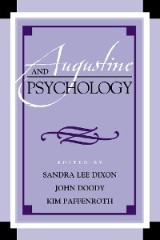Details

Augustine and Psychology
Augustine in Conversation: Tradition and Innovation
|
97,99 € |
|
| Verlag: | Lexington Books |
| Format: | EPUB |
| Veröffentl.: | 21.12.2012 |
| ISBN/EAN: | 9780739179192 |
| Sprache: | englisch |
| Anzahl Seiten: | 254 |
DRM-geschütztes eBook, Sie benötigen z.B. Adobe Digital Editions und eine Adobe ID zum Lesen.
Beschreibungen
<span><span><span>The essays in </span><span>Augustine and Psychology</span><span>, edited by Sandra Lee Dixon, John Doody, and Kim Paffenroth, relate St. Augustine to the modern theory and practice of psychology in several ways. The contributors analyze Augustine’s own examination of himself (and occasionally others) to see to what extent he himself was a “doctor” or practiced “therapy” in ways that we can recognize and appreciate; they find connections between his theories of memory and mind, and modern theories of the same; they consider the influences and context in which he worked, and how those affected him and his ideas of the mind and soul; and, lastly, the contributors subject St. Augustine to the scrutiny of modern psychoanalysis (and critique such scrutiny where appropriate).</span></span></span>
<span><span><span>The essays here show the interface and relevance of psychology to theology (and vice versa), and they do so in a way that will be useful to upper-level undergraduate or graduate-level courses in religious studies. The collection is also useful for presenting classic essays as well as new essays appearing here for the first time.</span></span><br><span></span></span>
<span><span><span>Chapter 1: The Journey to Simplicity: Augustine and the Plural Experiences of the Soul</span></span><br><span><span>Todd Breyfogle</span></span><br><span><span>Chapter 2: Teaching Freud and Interpreting Augustine’s </span><span>Confessions</span></span><br><span><span>Sandra Lee Dixon</span></span><br><span><span>Chapter 3: Reading Augustine, Monica, Milan with Attention to Cultural Interpretation and Psychological Theory</span></span><br><span><span>Sandra Lee Dixon</span></span><br><span><span>Chapter 4: St. Augustine: Archetypes of Family</span></span><br><span><span>Anne Hunsaker Hawkins</span></span><br><span><span>Chapter 5: Between Two Worlds</span></span><br><span><span>Morton Kelsey</span></span><br><span><span>Chapter 6: Augustine among the Ancient Therapists</span></span><br><span><span>Paul R. Kolbet</span></span><br><span><span>Chapter 7: Augustine and Freud: The Secularization of Self-Deception</span></span><br><span><span>Margaret R. Miles</span></span><br><span><span>Chapter 8: Augustine and Dopamine</span></span><br><span><span>Daniel B. Morehead</span></span><br><span><span>Chapter 9: Tears of Grief and Joy: Chronological Sequence and the Structure of </span><span>Confessions</span><span>, Book 9 </span></span><br><span><span>Kim Paffenroth</span></span><br><span><span>Chapter 10: On Seeing the Light: Assessing Psychoanalytic Interpretations of Vision in Augustine’s </span><span>Confessions</span></span><br><span><span>William B. Parsons</span></span><br><span><span>Chapter 11: Augustine’s Extraordinary Theory of Memory</span></span><br><span><span>Raymond J. Shaw</span></span></span>
<span><span><span>Sandra Lee Dixon</span><span> is associate professor of psychology of religion at the University of Denver.</span></span><br><span></span><br><span><span>John Doody</span><span> is professor of philosophy and Associate Dean of Arts and Sciences at Villanova University.</span></span><br><span></span><br><span><span>Kim Paffenroth</span><span> is professor of religious studies at Iona College.</span></span></span>

















